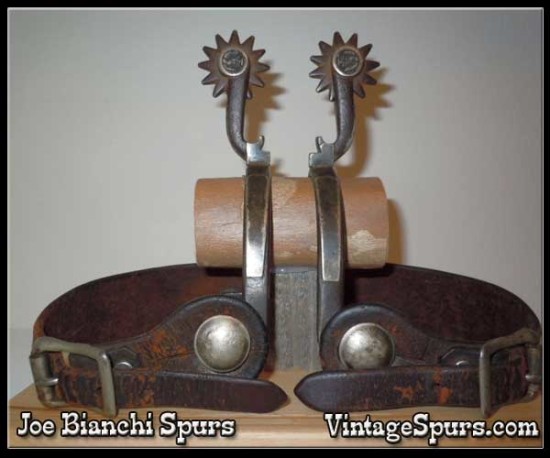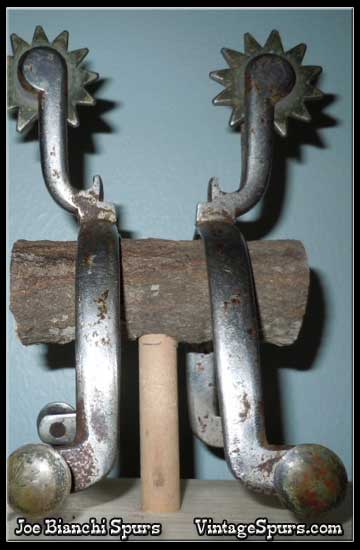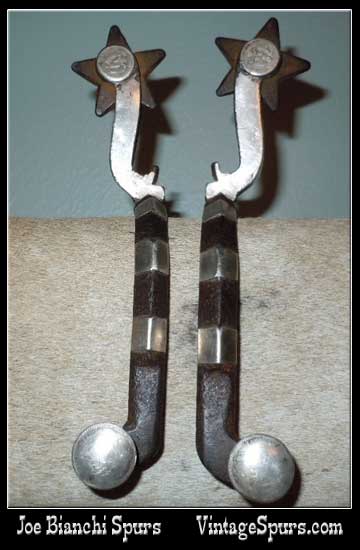Joe Bianchi, Blacksmith and Master Texas Spur Maker
Article Written by Philip Bianchi
BIANCHI, JOE (1871–1949). Joe Bianchi, blacksmith and master Texas spur maker, was born on August 5, 1871, in Origgio, Italy, to Luigi and Maria (Zafferoni) Bianchi. He came to America with his family in 1885, this after his oldest brother Vincent had sent back a good report from Victoria, Texas, to the family in Italy. Vincent worked on building the New York, Texas and Mexican Railroad from Rosenberg to Victoria which became known as the “Macaroni Line” named such because of the imported Italian railroad workers and the many shipments of pasta brought in for them.
The youngest of the four brothers, Joshua, later became an engineer for Southern Pacific Railroad, while Paul, the second of the four Bianchi brothers went right to work blacksmithing and Joe stayed on the farm since he was just fourteen years old when the family arrived. As early as 1896 Paul and Joe had formed a partnership and worked together until Joe’s marriage to Mathilde Urban on February 22, 1905, at which time Joe built a house and a shop next door on South William Street. Joe and Mathilde had no children. Paul continued blacksmithing until the Spanish influenza took his life in 1919.
Joe Bianchi Handmade Bits and Spurs
After an injury shoeing a mule put Joe in the hospital, he decided he would focus on making spurs, bits, and branding irons and discontinue the back breaking work of shoeing horses and mules. While Joe is best-known for his spurs and bits, which have become quite collectible, he could do most anything with iron and did general repair work also. One of his biggest jobs was making wrought iron benches for the city square and fencing for the city of Victoria. As a devout Catholic he would always gladly repair any item that the parochial schools brought to him.
Joe Bianchi was also very active in civic affairs including the volunteer fire department and the D. M. O’ Connor Guards, formed during the Spanish-American War of 1898. Joe was well-liked and respected in the community, and although his shop was a local hangout and visitors were always welcomed, he was all business when he was at work. Like most craftsmen of the time, Bianchi chose to fall behind in production rather than sacrifice the quality of his work which is legendary. Evidence of this is the guarantee in each of his pocket-sized catalogues: “All spurs and bits made by me are fully guaranteed and any that prove defective will be replaced or neatly repaired without charges, provided the defective parts are returned to me.” Being meticulous in his work, Joe would even discard spurs or bits that were not just perfect.
Joe Bianchi was a major influence on early Western spur makers due to the design of his hand-forged ‘bottle-opener’ spurs which he did not invent but which he popularized among many spur makers of his day. The bottle-opener spur also became known as the ‘Victoria Spur’ and is still copied by spur makers today.
Examples of Joe’s work can be seen in many Texas museums, including Victoria’s Museum of the Coastal Bend, the Coryell Museum in Gatesville, the Haley Museum in Midland, and the Bob Bullock Texas State History Museum in Austin. Bianchi spurs are also displayed at the Autry National Center of the American West in Los Angeles, California. His work has been featured on Antiques Roadshow on PBS television stations.
Joe won many awards for his work, such as a blue ribbon at the DeWitt County Fair in 1909. Joe was also honored by a number of annual exhibits at the Victoria Public Library and by an exhibit at the Nave Museum in Victoria in 2005, which featured his work and that of leather craftsman C.I. Tibiletti and artist Robert Summers. One of Joe’s anvils is on permanent loan to the Museum of the Coastal Bend in Victoria as well. A few old-time ranchers can still be seen wearing Bianchi spurs another testimony to the quality of his work. Joe Bianchi died of liver cancer on May 29, 1949, at the age of seventy-seven. He was buried in the Catholic Cemetery #2 in Victoria



